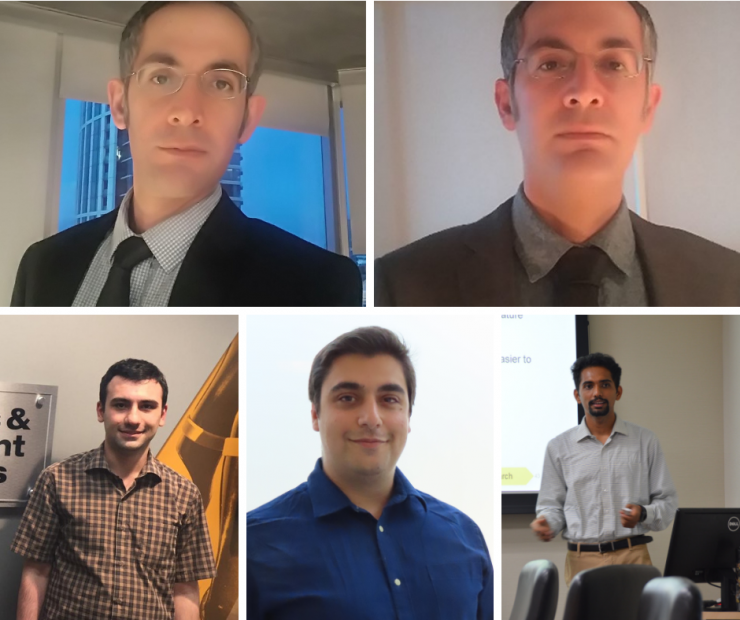Five ECE Graduates Win Sigma Xi Best Ph.D. Thesis Awards
Apr 01, 2021 — Atlanta, GA

Clockwise from upper left: Hossein Taghinejad, Mohammad Taghinejad, Siddharth Varughese, Hakki Mert Torun, Mehrdad Tahmasbi
Five recent graduates from the School of Electrical and Computer Engineering (ECE) have been chosen for Georgia Tech Sigma Xi Best Ph.D. Thesis Awards. They are Hossein Taghinejad, Mohammad Taghinejad, Mehrdad Tahmasbi, Hakki Mert Torun, and Siddharth Varughese.
Hossein Taghinejad’s thesis is entitled “Synthesis of Alloys and Lateral Heterostructures of Atomically Thin Transition-Metal Dichalocogenides for Optoelectronic Applications.” Breakthroughs in microelectronics and advances in material development have always worked in tandem. Currently, microelectronics needs to adjust itself to welcome the era of quantum computing. In collaboration with his colleagues who work on ECE Professor Ali Adibi’s team, Taghinejad developed a quantum platform made of heterogeneous integration of atomically thin semiconductors, known as 2D semiconductors, with applications in the next generation of transistors and optoelectronic devices. Advised by Adibi, Taghinejad graduated in August 2020 and is now a postdoctoral fellow in the School of Physics at the University of California, Berkeley.
Mohammad Taghinejad’s thesis is entitled “Active and Nonlinear Nanophotonics Facilitated by Hot-Carrier Dynamics.” As electronics approaches its intrinsic speed limitations, pursuing new computational paradigms for data processing is inevitable. Optical computing – replacing electrons with photons – has been introduced as a powerful alternative. The success of optical computing depends on the realization of optical switches to fulfill the role of electronic transistors in optical platforms. During his Ph.D. research, under the supervision of ECE Associate Professor Wenshan Cai, Taghinejad employed nonlinear optical effects to design and implement ultracompact optical switches with terahertz operation speed and very low energy consumption. Taghinejad graduated in December 2020 and is now a postdoctoral research fellow in the Department of Materials Science and Engineering at Stanford University.
Mehrdad Tahmasbi’s thesis is entitled “Covert Communication: From Classical Channels to Quantum Channels.” Tahmasbi worked on a recently-explored notion of security called undetectability of a communication protocol. With an abundance of adversarial activities around modern communication systems, an unauthorized party could potentially extract useful information from the very existence of communication. Tahmasbi studied the fundamental limits of communication in several scenarios of interest, with the additional constraint that its probability of detection should remain negligible. Advised by ECE Associate Professor Matthieu Bloch, Tahmasbi graduated in May 2020 and is now a postdoctoral fellow at the University of Amsterdam (The Netherlands).
Hakki Mert Torun’s thesis is entitled “Machine Learning Based Design and Optimization for High-Performance Semiconductor Packaging and Systems.” As the demand for high-performance electronics increase, designing such systems becomes more and more complex. Conventional design methodologies either can’t handle such complexity or are too slow and significantly delay design closure. This thesis presents new, machine learning based modeling and optimization methodologies as a way to develop a fast and accurate design framework that can handle complexity of modern-day semiconductor systems. Advised by ECE Professor Madhavan Swaminathan, Torun graduated in October 2020 and is now a power integrity engineer with Apple in San Diego, California.
Siddharth Varughese’s thesis is entitled “Performance Analysis and Impairment Identification in Optical Communication Systems.” Over the past 50 years, optical communications systems have grown tremendously, achieving exceptional data rates and reaches owing to the introduction of various techniques and technologies. However, as optical networks continue to grow, these techniques and technologies will introduce new limitations to all optical communications systems. The objectives of Varughese’s research were to identify how these techniques and technologies would affect link performance, manufacturing efficiency, and network operation and maintenance, and develop methodologies to mitigate or minimize these limitations for future internet-based applications, such as 5G mobile communication, Internet of Things, and smart appliances. Advised by ECE Professor Stephen Ralph, Varughese graduated in December 2020 and is now a staff optical development engineer for subsea solutions at Infinera Corporation, located in Savage, Maryland.
School of Electrical and Computer Engineering




